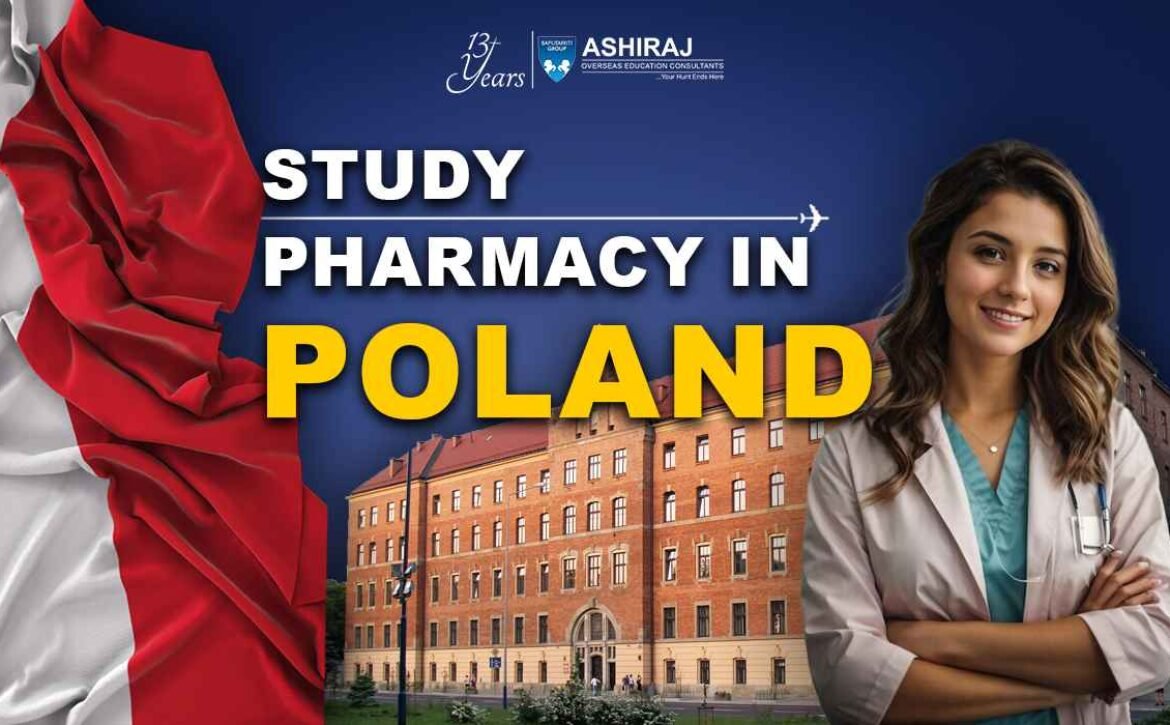
Pharmacy in Poland
Pharmacy in Poland encapsulates the multifaceted landscape of pharmaceutical services and practices within the country. Poland’s pharmacy sector reflects a blend of traditional approaches and modern advancements, catering to the diverse healthcare needs of its populace. With a rich history rooted in herbal medicine and apothecary traditions, Polish pharmacies have evolved into sophisticated establishments offering a wide array of pharmaceutical products and services.
In recent years, Pharmacy in Poland has undergone significant transformations, aligning with international standards while also addressing unique local healthcare challenges. The profession of pharmacy is highly respected, and pharmacists play pivotal roles not only in dispensing medications but also in providing patient education, health promotion, and preventive care. Moreover, Poland’s pharmacy sector is characterized by stringent regulatory frameworks ensuring the quality, safety, and efficacy of pharmaceutical products, thus fostering trust and reliability among consumers.
Why to Study Pharmacy in Poland?
- Internationally Recognized Programs: Poland offers top-tier pharmacy education programs accredited by global standards, ensuring quality and recognition worldwide.
- Cutting-Edge Curriculum: Pharmacy courses in Poland are designed to incorporate the latest advancements in pharmaceutical sciences, preparing students with relevant and up-to-date knowledge and skills.
- Multicultural Experience: Studying pharmacy in Poland provides students with exposure to a diverse range of cultures and perspectives, enriching their educational journey and fostering cross-cultural understanding.
- State-of-the-Art Facilities: Universities and colleges in Poland boast modern laboratories and facilities, equipped with advanced technologies to facilitate hands-on learning and research opportunities.
- Affordable Tuition Fees: Compared to other European countries, studying pharmacy in Poland is relatively affordable, with reasonable tuition fees and living costs, making it an attractive option for international students.
- Opportunities for Research: Poland offers ample opportunities for pharmacy students to engage in research projects, collaborations, and internships, enhancing their academic and professional development.
- Strong Pharmaceutical Industry: Poland’s robust pharmaceutical industry provides students with ample opportunities for internships, job placements, and networking, ensuring a smooth transition from academia to the workforce.
- High-Quality Healthcare System: With a well-developed healthcare system, pharmacy students in Poland have access to clinical experiences and practical training in various healthcare settings, enriching their learning experience.
Studying pharmacy in Poland not only equips students with a comprehensive education but also opens doors to exciting career prospects in the dynamic field of pharmaceutical sciences.
Top Universities to Study Pharmacy in Poland
University | QS World University Ranking 2023 | Type of University | Average Annual Fees | Programs Offered |
Jagiellonian University | 301-350 | Public | $2,000 – $4,000 | Pharmacy, Pharmaceutical Biotechnology |
Medical University of Warsaw | 401-450 | Public | $2,500 – $3,500 | Pharmacy, Clinical Pharmacy, Pharmacology |
University of Warsaw | 451-500 | Public | $2,000 – $3,000 | Pharmacy, Pharmaceutical Chemistry, Pharmacognosy |
Medical University of Gdańsk | 501-550 | Public | $2,500 – $3,500 | Pharmacy, Clinical Pharmacy, Pharmacoeconomics |
Wroclaw Medical University | 551-600 | Public | $2,000 – $3,500 | Pharmacy, Pharmaceutical Technology, Pharmacotherapy |
The list of top universities in Poland for Pharmacy in Poland highlights institutions renowned for their academic excellence and commitment to pharmaceutical education. These universities offer a diverse range of programs tailored to meet the evolving needs of the pharmacy industry, ensuring graduates are well-equipped for successful careers in this field. With competitive average annual fees and a variety of programs covering
pharmaceutical sciences, clinical pharmacy, and pharmacology, students have ample opportunities to pursue their academic and professional aspirations in pharmacy.
Course Curriculum for Pharmacy in Poland
- Foundational Sciences: The curriculum covers fundamental subjects such as chemistry, biology, and anatomy, providing students with a strong scientific foundation essential for understanding pharmaceutical principles.
- Pharmacology and Pharmacotherapy: Students delve into the study of drugs, their mechanisms of action, and therapeutic uses, preparing them to evaluate and administer medications effectively.
- Pharmaceutical Formulation: The curriculum includes courses on pharmaceutical dosage forms, drug delivery systems, and compounding techniques, equipping students with the skills to prepare and dispense medications accurately.
- Clinical Pharmacy Practice: Students learn to apply their knowledge in real-world healthcare settings, engaging in clinical rotations, patient counseling, and medication therapy management under the guidance of experienced pharmacists.
- Pharmaceutical Management: The curriculum addresses topics such as pharmacoeconomics, healthcare policies, and pharmacy management principles, preparing students to navigate the business aspects of the pharmacy profession.
- Research and Innovation: Pharmacy programs in Poland emphasize research methodologies and innovation, encouraging students to explore new advancements in pharmaceutical sciences and contribute to the field’s growth.
- Ethics and Professionalism: Students are trained in ethical principles, patient confidentiality, and professional conduct, ensuring they uphold the highest standards of integrity and accountability in their practice.
The pharmacy curriculum in Poland is comprehensive, integrating theoretical knowledge with practical skills and emphasizing the importance of professionalism and innovation in advancing the Pharmacy in Poland field.
Eligibility Criteria & Admission Requirements for MS in Pharmacy in Poland
- Language Proficiency: Applicants must demonstrate proficiency in English by providing either IELTS or TOEFL scores. The minimum required scores for IELTS are 6.5 overall with no band less than 6.0, and for TOEFL, a score of 80 or above is typically required.
- Standardized Tests: Some universities may require applicants to submit scores from standardized tests such as GRE or GMAT. The minimum required scores for GRE are typically around 300 for combined verbal and quantitative sections, while for GMAT, scores above 550 are often preferred.
- Academic Certificates: Applicants must provide proof of completion of secondary education or equivalent qualifications, such as high school diplomas or certificates.
- Passport & Student Visa: International students need a valid passport and must obtain a student visa to study in Poland. The visa application process involves submitting required documents, including an acceptance letter from a Polish university, proof of financial means, and health insurance.
- Work Experience: While not always mandatory, some universities may consider applicants’ work experience in relevant fields such as healthcare or pharmaceuticals as part of the admissions criteria.
Test | Minimum Score |
IELTS | 6.5 overall with no band less than 6.0 |
TOEFL | 80 or above |
GRE | Around 300 for combined verbal and quantitative sections |
GMAT | Above 550 |
Meeting these eligibility criteria ensures that applicants are adequately prepared to pursue a Pharmacy in Poland education and contribute effectively to the field upon graduation.
Documents Required for Studying Pharmacy in Poland
- Passport: A valid passport is essential for international students applying to study Pharmacy in Poland, serving as proof of identity and nationality.
- Two Letters of Recommendation (LOR): Applicants are typically required to submit two LORs from academic or professional references attesting to their qualifications and character.
- Statement of Purpose (SOP): An SOP outlining the applicant’s academic background, career goals, and reasons for choosing Pharmacy in Poland helps admissions committees assess the candidate’s suitability for the program.
- Curriculum Vitae (CV): A comprehensive CV highlighting the applicant’s educational achievements, work experience, extracurricular activities, and skills is required for admissions consideration.
- Official High School Transcripts/Certificates: Applicants must provide official transcripts or certificates from their high school or equivalent institutions, demonstrating completion of secondary education.
- Work Experience Certificate: If applicable, a work experience certificate detailing the applicant’s professional experience in relevant fields such as healthcare or pharmaceuticals may be required.
- Proof of Financial Resources: To obtain a student visa, applicants must demonstrate sufficient financial means to cover tuition fees, living expenses, and other associated costs for the duration of their studies in Pharmacy in Poland.
Ensuring the timely submission of these documents is crucial for a smooth admissions process and enrollment in Pharmacy in Poland programs.
Admission Process for Pharmacy in Poland
- Research: Explore different universities in Poland offering Pharmacy programs and review their admission requirements, curriculum, and faculty expertise.
- Choose Universities: Select the universities that best align with your academic and career goals in Pharmacy in Poland.
- Prepare Documents: Gather all required documents, including academic transcripts, standardized test scores (if applicable), passport, LORs, SOP, CV, work experience certificate, and proof of financial resources.
- Submit Applications: Complete online application forms for your chosen universities and upload the required documents as per their guidelines.
- Pay Application Fees: Some universities may require payment of an application fee, ensure timely payment to complete the application process.
- Wait for Response: After submitting your application, wait for the university to review your materials and provide an admission decision.
- Acceptance and Enrollment: Upon receiving an acceptance letter, follow the instructions provided by the university to confirm your enrollment, including paying any required deposits or fees.
- Apply for Student Visa: Once enrolled, apply for a student visa at the nearest Polish consulate or embassy, providing necessary documents including the acceptance letter and proof of financial resources.
- Arrival and Orientation: Upon obtaining your visa, make travel arrangements to Poland and attend orientation sessions organized by the university to familiarize yourself with campus life and academic expectations.
Following these steps diligently ensures a smooth admission process for pursuing Pharmacy in Poland programs.
“Education is the most powerful weapon which you can use to change the world.”
Nelson Mandela
Cost of Pharmacy Course in Poland
- Tuition Fees: The average annual tuition fees for Pharmacy in Poland programs range from $2,000 to $4,000 for international students, depending on the university and the specific program.
- Living Expenses: Living expenses such as accommodation, food, transportation, and personal expenses vary depending on the city and lifestyle choices. On average, students should budget around $500 to $800 per month.
- Books and Supplies: Additional expenses include textbooks, study materials, and laboratory supplies, which may cost approximately $200 to $400 per academic year.
- Health Insurance: International students are required to have health insurance coverage during their stay in Poland. The cost of health insurance varies but typically ranges from $300 to $600 per year.
- Travel Expenses: Travel expenses for visa applications, flights to and from Poland, and local transportation within the country should also be considered.
- Miscellaneous Fees: Some universities may charge miscellaneous fees for services such as student activities, sports facilities, and administrative costs, which can amount to a few hundred dollars per year.
- Total Cost: Taking all expenses into account, the total cost of studying Pharmacy in Poland for international students can range from $8,000 to $15,000 per year, depending on individual circumstances and lifestyle choices.
Scholarships for Pharmacy Courses in Poland
Scholarship Name | Amount | Application Deadline |
Polish Government Scholarships | Varies | April 30 |
Erasmus+ Scholarships | Varies | February 1 |
University-specific Scholarships | Varies | Varies |
Fulbright Scholarships | Varies | October 8 |
Marie Curie Scholarships | Varies | March 20 |
Scholarships for Pharmacy in Poland offer financial assistance to international students pursuing pharmacy education. These scholarships cover various expenses, including tuition fees, accommodation, and living expenses, easing the financial burden for students. The application deadlines for these scholarships vary depending on the scholarship provider and the specific program. Students need to research and apply for scholarships well in advance to meet the deadlines and increase their chances of receiving financial support for Pharmacy in Poland studies.
Career Opportunities After Pharmacy in Poland
Job Profile | Average Salary (per year) |
Pharmacist | $25,000 – $35,000 |
Clinical Pharmacist | $30,000 – $40,000 |
Pharmaceutical Sales Representative | $20,000 – $30,000 |
Regulatory Affairs Specialist | $35,000 – $45,000 |
Research Scientist | $40,000 – $50,000 |
Pharmacy in Poland opens doors to diverse career opportunities with competitive salaries. Pharmacists play a crucial role in dispensing medications, providing patient care, and promoting health education, with average salaries ranging from $25,000 to $35,000 per year. Clinical pharmacists, specializing in patient care within healthcare settings, earn higher salaries, averaging between $30,000 and $40,000 annually. Pharmaceutical sales representatives engage in marketing and sales of pharmaceutical products, earning $20,000 to $30,000 yearly. Regulatory affairs specialists ensure compliance with pharmaceutical regulations, earning salaries ranging from $35,000 to $45,000 annually. Research scientists contribute to pharmaceutical innovation and development, with salaries averaging between $40,000 and $50,000 per year. Pursuing Pharmacy in Poland not only offers rewarding career prospects but also ensures a stable and lucrative professional journey in the pharmaceutical industry.
Frequently Asked Questions About Pharmacy in Poland
Admission requirements typically include academic transcripts, standardized test scores (IELTS/TOEFL, GRE/GMAT), letters of recommendation, statement of purpose, and proof of financial resources.
Yes, various scholarships, including government-funded scholarships, university-specific scholarships, and international scholarship programs like Erasmus+, are available to support international students pursuing Pharmacy in Poland.
Pharmacy programs in Poland typically span five to six years, including both theoretical coursework and practical training components.
Yes, international students in Poland are allowed to work part-time during their studies, usually up to 20 hours per week during the academic year and full-time during holidays.
While many Pharmacy programs in Poland are offered in English, learning the Polish language can be beneficial for daily life and communication, but it is not usually a requirement for admission.
Graduates of Pharmacy in Poland programs can pursue various career paths, including roles as pharmacists, clinical pharmacists, pharmaceutical sales representatives, regulatory affairs specialists, and research scientists.
The cost of studying Pharmacy in Poland for international students varies depending on factors such as tuition fees, living expenses, and personal spending habits, but it typically ranges from $8,000 to $15,000 per year.
Yes, international students who graduate from Polish universities with a Pharmacy degree are eligible to apply for post-graduation work permits, allowing them to seek employment opportunities in the country.
Yes, many universities in Poland offer opportunities for research projects, internships, and practical training in pharmaceutical companies, hospitals, and research institutions as part of the Pharmacy curriculum.
International students can apply for a student visa to study Pharmacy in Poland by submitting required documents, including an acceptance letter from a Polish university, proof of financial means, health insurance, and a valid passport, at the nearest Polish consulate or embassy.




